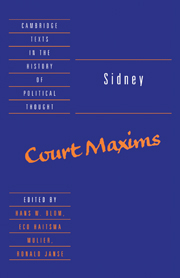Introduction
Published online by Cambridge University Press: 05 June 2012
Summary
Three crucial elements influenced Sidney's political writings: his extraordinary career, his bold character, and no doubt his particular cultural background. Court maxims, discussed and refelled was written while Sidney was in his forties and experiencing a large measure of adversity during his self-inflicted exile to the Continent. Sidney intended this text to unite English republicans, and possibly their Dutch counterparts as well, into an effort to re-establish the Commonwealth in England. But it would be inappropriate to look at it as just a ‘work of propaganda’ (Blair Worden, ‘The commonwealth kidney of Algernon Sidney’, Journal of British Studies, 24 (1985) 1–40, p. 10). A remarkably uncompromising text, it contains ‘a more complete exposure of the assumptions behind, and the tensions within, Sidney's thought as a whole’ (Jonathan Scott, Algernon Sidney and the English republic, 1623–1677 (Cambridge, 1988), p. 7) than his later Discourses concerning government which, in more direct response to the actual circumstances of the 1680s, was to be published in 1698. The Court maxims abound with classical and biblical references, side by side with machiavellian themes and reverberations of Sidney's own education as a squire, providing the context for his view of English history and the nature of politics. The tragedy of the Court maxims, however, was that its author was already in the process of losing ground as a politician among English exiles on the Continent because of his abrasive character, while the shifting political situation made its publication inappropriate and left it gathering dust in the archives for more than two centuries.
- Type
- Chapter
- Information
- Sidney: Court Maxims , pp. xi - xxviPublisher: Cambridge University PressPrint publication year: 1996

